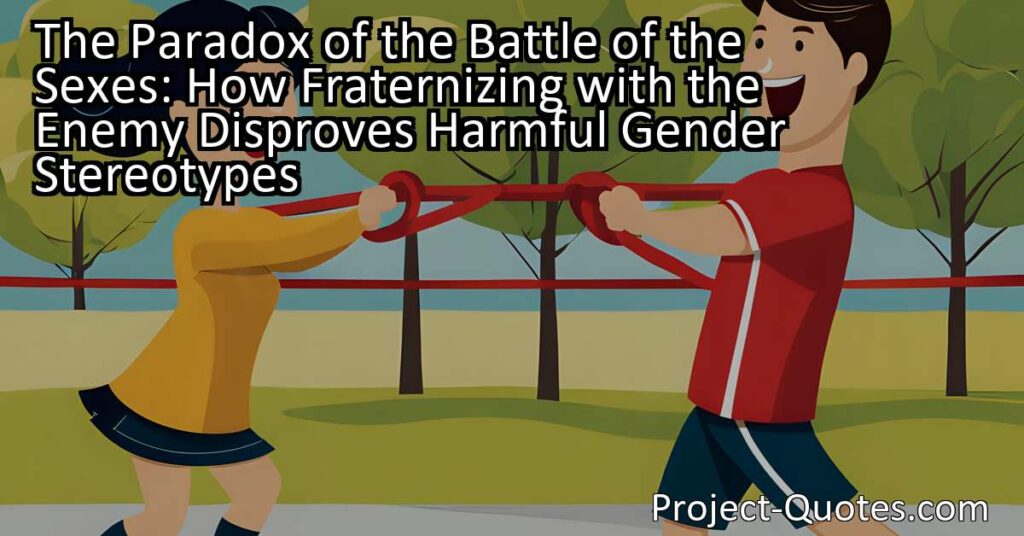No one will ever win the battle of the sexes; there’s too much fraternizing with the enemy.
Henry A. Kissinger
The Paradox of the Battle of the Sexes: How Fraternizing with the Enemy Disproves Harmful Gender Stereotypes explores the idea that viewing men and women as adversaries perpetuates harmful gender stereotypes. By emphasizing fraternization and cooperation between the sexes, we can challenge these stereotypes and promote inclusivity. This engaging content highlights the importance of breaking down barriers and fostering relationships that go beyond superficial divisions.
Table of Contents
Meaning of Quote – No one will ever win the battle of the sexes; there’s too much fraternizing with the enemy.
In the world of relationships and interactions between men and women, there has always been a certain level of competition. However, attempting to declare a victor in this so-called “battle of the sexes” has proven to be a futile endeavor. As the wise Henry A. Kissinger once said, “No one will ever win the battle of the sexes; there’s too much fraternizing with the enemy.” This intriguing quote suggests that men and women, despite their differences and perceived opposition, are in fact not enemies at all. Through countless instances of collaboration, coexistence, and camaraderie, it becomes clear that there is a deeper connection that goes beyond mere rivalry.
To fully comprehend the significance of Kissinger’s words, it is essential to dive into the fundamental aspects of this ongoing “battle.” At its core, the battle of the sexes refers to the perceived differences and conflicts between males and females. Throughout history, this concept has manifested in various ways, ranging from societal norms and expectations to power struggles and gender inequality.
However, as Kissinger points out, there is a paradoxical element to this perceived battle. Despite the supposed animosity, there is an undeniable sense of attraction and interdependence between men and women. Fraternizing with the enemy, as Kissinger puts it, emphasizes the fact that interactions and relationships between the sexes are not solely characterized by conflict. Rather, there exists a complex interplay of cooperation, understanding, and mutual respect.
Arguably, one of the most evident forms of fraternization between men and women is romantic relationships. Love, desire, and attraction have been integral parts of human existence for as long as history can recall. Throughout the ages, individuals from both genders have come together in pursuit of shared affection, companionship, and a deep emotional connection.
Romantic relationships thrive on the understanding that the battle of the sexes is not a true battle at all. In the realm of love, the intention is not to triumph over one another, but rather to build a foundation of support, trust, and growth together. It is within these relationships that the notions of “enemy” and rivalry lose their significance, being replaced by compassion, empathy, and the desire for a harmonious partnership.
Beyond the realm of romance, however, fraternization between men and women is widespread in countless other spheres of life. In the world of work, for instance, collaboration and cooperation between the sexes are essential for progress and success. From boardrooms to project teams, individuals from all genders come together, pooling their diverse perspectives, skills, and experiences in a collective effort to achieve common goals.
Fraternization between men and women in the workplace has proven to be a catalyst for innovation, creativity, and increased productivity. Studies have consistently shown that gender-diverse teams tend to outperform homogenous groups, mainly due to the greater range of perspectives and approaches that result from the participation of individuals from different genders. This underscores the importance of breaking down the barriers of the battle of the sexes in order to tap into the full potential of collaboration.
Moreover, it is crucial to acknowledge that the battle of the sexes also perpetuates harmful gender stereotypes and prejudices. By viewing men and women as adversaries, society fosters an atmosphere of competition and divisiveness. This perpetuates the notion that one gender is superior or more deserving than the other, which leads to discrimination, inequality, and the marginalization of certain individuals.
Instead, embracing fraternization is a path towards dispelling these harmful notions and promoting inclusivity. By recognizing that men and women are not adversaries but rather allies, we can address the underlying issues that perpetuate gender inequalities. This requires an open dialogue, empathy, and mutual understanding, which can be achieved by building bridges of communication and fostering relationships that go beyond superficial divisions.
In conclusion, Henry A. Kissinger’s quote brilliantly encapsulates the complex nature of the battle of the sexes. While it is undoubtedly true that differences exist between men and women, it is equally important to recognize that these differences should not be the basis for animosity or rivalry. Fraternizing with the enemy, as Kissinger suggests, opens up the possibility of seeing the opposite sex not as adversaries but as valuable partners in life’s journey.
Understanding, respect, and cooperation between men and women are vital for personal growth, societal progress, and the pursuit of harmonious relationships. By embracing fraternization, we can move away from the notion of a battle and instead foster an environment of collaboration, equality, and mutual support. Only by doing so can we transcend the limitations imposed by the battle of the sexes and unlock the true potential that lies within each individual, regardless of their gender.
I hope this quote inspired image brings you hope and peace. Share it with someone who needs it today!


